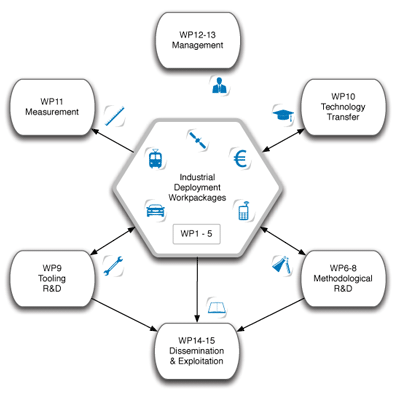Formal engineering methods enable greater mastery of complexity than do traditional software engineering pro-cesses. It is the central role played by mechanically-analysed formal models throughout system development that enables mastery of complexity. As well as leading to big improvements in system dependability, greater mastery of complexity leads to greater productivity by reducing the expensive test-debug-rework cycle and by facilitating increased reuse of software.
The successful three-year FP6 STREP RODIN project on Rigorous Open Development Environment for Complex Systems (2004-2007, http://rodin.cs.ncl. ac.uk/) researched and developed industrial strength methods and tools paving the way for the technology to be deployed. In particular, RODIN delivered an extensible open source platform, based on Eclipse, for refinement-based formal methods along with a body of work on formal methods for dependable systems. DEPLOY exploits and builds on these results.
In DEPLOY five leading European companies, representing five major sectors: transportation (Siemens), automotive (Bosch), space (Space Systems), telecommunication (Nokia) and business information (SAP), will deploy advanced engineering approaches to further strengthen their development processes in order to improve competitiveness

Objectives
The overall aim of DEPLOY is to make major advances in engineering methods for dependable systems through the deployment of formal engineering methods. The work is driven by the tasks of achieving and evaluating the industrial take-up of the DEPLOY methods and tools, initially in the five sectors which are key to European industry and society.
The aim will be achieved with a coherent integration of scientific research, technology development and industrial deployment of the technology. The complementary expertise and technological base of the industrial deployment partners and the technology provider partners will be combined to achieve a set of challenging scientific and technological objectives.
Consortium
DEPLOY offers a balanced interplay between industrial deployment, scientific research and tool development, where companies in five sectors join their forces with eight technology providers to meet the goal.
The industrial sectors, transportation (Siemens), automotive (Bosch), space (Space Systems), telecommunication (Nokia) and business information (SAP), comprise a palette of important European base industries of today. The companies possess different maturity levels when it comes to deploying formal approaches.
The five academic partners are world leaders in formal methods research, that have considerable experience in developing and applying resilience methods as well as a wide range of formal approaches.
The tool vendors, Systerel and ClearSy, have long-standing experience in developing tool support for formal engineering methods. CETIC has considerable experience in industrial quality measurement and will be in charge of the assessment activities.
The project is coordinated by Newcastle University with a dedicated Project Office set at the School of Computing Science. Project partners are Newcastle University (UK), Aabo Akademi University (Finland), Bosch (Germany), CETIC (Belgium), ClearSy (France), ETH Zurich (Switzerland), Heinrich-Heine Universität Düsseldorf (Germany), Nokia Research Center (Finland), SAP AG (Germany), Siemens Transportation Systems (France), Space Systems Finland (Finland), Systerel (France), University of Southampton (UK). Subcontractors are Martyn Thomas (UK) and RATP (France).
Strategies for Deployment
The key to achieving successful and cost-effective deployment of advanced engineering technology will be the construction of strategies for deployment. DEPLOY will develop this concept taking into account the specific characteristics of ways in which rigorous engineering technologies are applied in each industrial sector.
Results
DEPLOY will deliver methods and tools that:
- support the rigorous engineering of complex resilient systems from high level requirements down to software implementations via specification, architecture and detailed designs
- support the systematic reuse and adaptation of models and software thus addressing industry's requirement for high productivity and requirements evolution
- have been field-tested in and adapted for a range of industrial engineering processes
- are accompanied by deployment strategies for a range of industrial sectors
- are based on an open platform (Eclipse) and will themselves be open.
Measurable Outcomes
By the end of DEPLOY each industrial partner will achieve real deployment of formal engineering methods and tools in development of products and become self sufficient in the use of formal engineering methods. The deployments will enable us to provide scientifically valuable artefacts including formally developed dependable systems and results of systems analysis including a rich repository of models, proofs and other analysis results.
By extending the mathematical foundations of formal methods the project will deliver research advances in complex systems engineering methods that enable high degrees of reuse and dependability, and effective systems evolution that maintains dependability. DEPLOY will deliver a professional open development platform based on Eclipse that provides powerful modelling and analysis capabilities, is highly usable by practising engineers and is tailored to sector-specific engineering needs. Through the experience and insights gained in the industrial deployments DEPLOY will deliver strategies that enable the integration of formal methods and tools with existing sector-specific development processes.
DEPLOY will put in place an organisation which will be the home of the open platform, set up a body made of industrial users and technology providers whose role will be to coordinate technical decisions on the open platform and deliver training material covering general and sector-specific formal engineering methods.
Link:
http://deploy-project.eu/
Please contact:
Alexander Romanovsky
Newcastle University, UK
Tel: +44 191 222 81 35
E-mail: alexander.romanovsky![]() ncl.ac.uk
ncl.ac.uk










